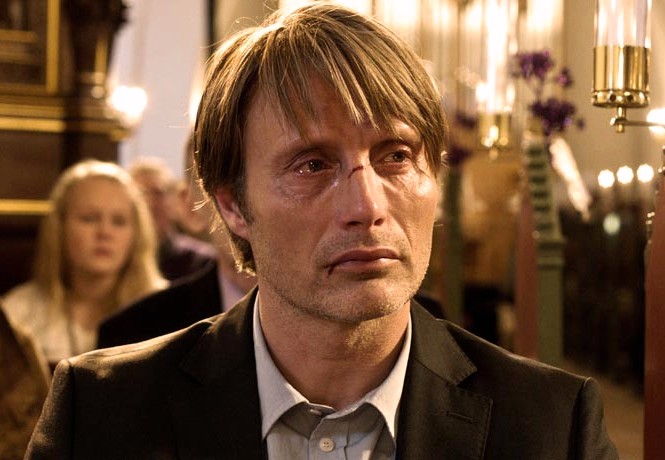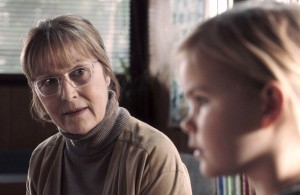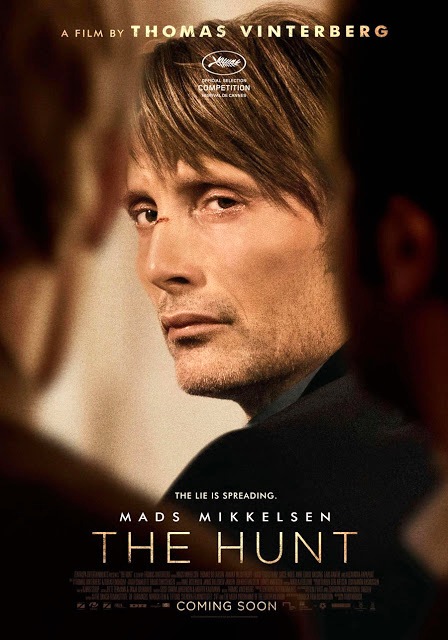
There won’t be a better foreign film this year. The Hunt (Danish, in English subtitles) features the great Mads Mikkelson as a genial kindergarten teacher wrongly accused of sexually violating a little girl in the school. Mikkelson played the cold calculating villain Le Chiffre in “Casino Royale,” a one-eyed Norse warrior in “Valhalla Rising,” and yet has played gentlemen like the orphanage supervisor in “After the Wedding.” His performance this time as Lucas, a decent man misunderstood, is the performance of his career (I likely see myself voting for him for Best Actor at year end award ballots). Mikkelson’s Lucas is dignified and mature for his small-town community, playful and motivating to his pupils, aghast at allegations, hard-staring and directly verbal at his accusers. There are films like this occasionally made where every scene captivates your attention, wringing out several what-if possibilities and dilemmas at once. You can’t look away.
Lucas has always had an appearance of being the good man to his fellow neighbor, and in history, is record-free. Knowing that the title premise will offer something of a manhunt, we get the feeling that good intentions will go awfully misinterpreted, and we quiver. Consider an early scene. Unattended girl Klara (Annika Wedderkopp) is fumbling about one morning outside the supermarket, and because he happens to be there, Lucas walks her home safely to her parents whom he knows socially. No suspicions to be made there – for this is local etiquette between friends and families. At school, he playfights with the boys like usual. Lucas is Klara’s favorite teacher, she goes over and kisses him on the mouth. Strange thing to do by the girl, but here again, nobody notices.
Love is unreturned so Klara now “hates” him. Typical child’s complaint, love/hate is a see-saw often heard. It’s only when Klara graphically describes a man’s “rod” to the principal that prompts a lump in the throat. Subsequently, Klara is privately sat down by two concerned adults, and not only are the questions leading, but you kind of gather the two are not even qualified to interview a child on a questionable criminal matter. Before the police are brought in, the other parents are told the occurrence of a sexual violation incident. It is assumed that each child is privately asked at their homes, “Did he touch you at school?”
Lucas has two confidantes, his brave and loyal teenage son and his recent girlfriend who seems sexually promiscuous. As we see Lucas lose friend after friend, we wonder if the police themselves are going to be any more diplomatic than the xenophobic locals. The hysteria is prevalent during Lucas’ trips to the supermarket, or bows to Church on Christmas Eve. Lucas makes a plea at others to look at him, and ask him if he’s really capable or not. How is a man in this position supposed to act? What is he supposed to say in order to prove his decency? I asked myself how I would confront such accusers.
Director Thomas Vinterberg (“The Celebration”) is co-founder of the Dogma 95 movement, which emphasizes simplified filmmaking that builds on story and performance in natural environment, excluding sound stages, special effects and unnatural audio-visual add-ons. This is an example of the movement at its best.
 “The Hunt” needs to be watched however because of its content. Too many out of touch adults don’t understand why children like Klara can make inadvertent false accusations. The words “penis” and “rod” dribbled out of her mouth because she stumbled upon… pornography by accident. This fault of parents and brother in the household is simply not understood by aging administrators in the education system, who don’t understand how susceptible children as young as five can click onto male penetrating female shots on a home computer. Combine that with small-town mass hysteria, and you have a modern day witchhunt on unfounded evidence. The great French film “Polisse” (2012) on the contrary was about proper, precise police work in revealing actual child abuse.
“The Hunt” needs to be watched however because of its content. Too many out of touch adults don’t understand why children like Klara can make inadvertent false accusations. The words “penis” and “rod” dribbled out of her mouth because she stumbled upon… pornography by accident. This fault of parents and brother in the household is simply not understood by aging administrators in the education system, who don’t understand how susceptible children as young as five can click onto male penetrating female shots on a home computer. Combine that with small-town mass hysteria, and you have a modern day witchhunt on unfounded evidence. The great French film “Polisse” (2012) on the contrary was about proper, precise police work in revealing actual child abuse.
Vinterberg trusts his intelligent audience is aware that small towns like his one depicted exists, and that a big city setting would not have been as compelling. Lucas, his protagonist, grew up fondly in this small community. This small life is what he knows, and he’s not about to run away from it even if it were the smarter thing to do. There are great actors every year it seems who play crusaders for the truth, but here, Mikkelson (who won Best Actor at the 2012 Cannes Film Festival) boldly plays a crusader for his own life and dignity. “The Hunt,” in a word, is flooring.
111 Minutes. Rated R. Danish in English subtitles.
FOREIGN FILM / FOOD FOR THOUGHT MOVIE / MASTERPIECE VIEWING
Film Cousins: “M.” (1931, Germany); “The Children’s Hour” (1961); “The Celebration” (1998, Denmark); “Polisse” (2012, France).





